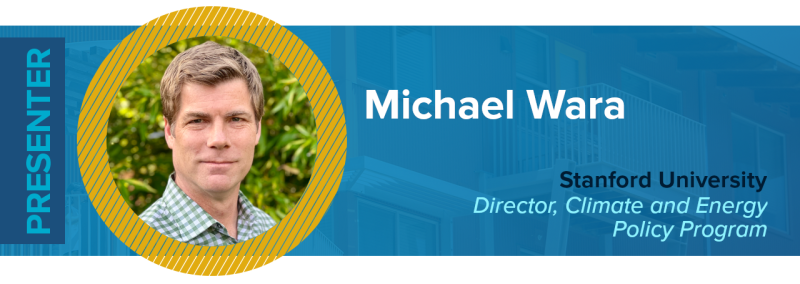Friday, October 24th, 2025 | 10:30 – 11:50am |
Special Location: Sacramento City College Davis Center, Room DCS 124, 1722 Jade St., Davis CA
Michael Wara, Director, Climate and Energy Policy Program, Stanford University
Join us for the UC Davis Energy & Efficiency Institute’s Fall 2025 Energy Seminar Series. These weekly Friday morning seminars feature leaders in energy and climate research, providing insights for students, professionals, and the public.
Where should energy affordability policy stop?
This presentation is a call to action for economists. California faces an electricity affordability crisis that directly threatens the clean energy transition. The two largest drivers of increased electricity costs in California are net metering and the costs of wildfire. At present, wildfire mitigation by utilities is almost entirely focused on ignition prevention. But costs of wildfire are driven by both ignition probabilities and consequences of ignition.
Evidence of spending on public and utility wildfire mitigation and suppression indicates that utility ignition avoidance is by a significant margin, the largest component, followed by fire fighting, of investment in efforts to avoid wildfire losses in California. Yet losses are not falling and utility ignitions, while significantly reduced, still occur under conditions where fire suppression is unlikely to be effective – whatever the investment in fire suppression. The insurance industry, the sector with the most to lose from wildfire, takes a completely different approach to mitigation, emphasizing instead the importance of consequence reduction via home hardening and defensible space interventions.
There is an urgent need to integrate across these silos – in order to develop cost-effective portfolios of mitigation that reduce losses at a societal level. These efforts are especially important given recent losses in Los Angeles, the stress these have placed on investor owned utility and primary insurer balance sheets, and ongoing work at the California Wildfire Fund to evaluate how best to manage the costs of wildfire in California.

Michael Wara is Director of the Climate and Energy Policy Program and a senior research scholar at the Stanford Woods Institute for the Environment as well as Senior Director for Policy at the Sustainability Accelerator within the Stanford Doerr School of Sustainability. Wara organizes and manages cross-functional teams of post docs, legal fellows and graduate students that provide fact-based, bipartisan, technical and legal assistance to policymakers, environmental justice advocates, and tribes engaged in the development of novel climate and energy law and regulation. He also facilitates the connection of Stanford faculty with cutting edge policy debates on climate, energy and climate impacts, leveraging Stanford’s energy, climate and natural resource expertise to craft real world solutions to these challenges.
Wara’s legal and policy scholarship focuses on wildfire, climate mitigation, energy innovation, and regulated industries. He collaborates with economists, engineers and scientists in research on the design and evaluation of technical and regulatory solutions to society’s climate and energy challenges.
Wara has served as a Wildfire Commissioner for the California, as a member of the California Catastrophe Council, the oversight body of the California Wildfire Fund, as a consultant to the Senate pro Tem on wildfire issues, and as a consultant to CPUC and OEIS on utility wildfire risk management. Wara has served on multiple National Academy of Sciences and California Council on Science and Technology reports. He is also a member of the Tamalpais Design Review Board.
Prior to joining Woods, Wara was an associate professor at Stanford Law School and an associate in Holland & Knight’s government practice. He received his J.D. from Stanford Law School and his Ph.D. in Ocean Sciences from the University of California at Santa Cruz.
